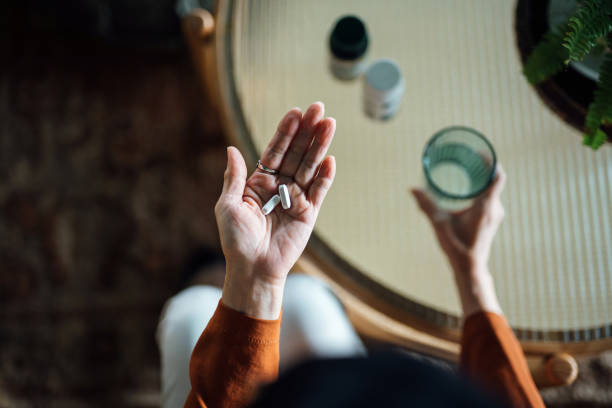Depression and anxiety are two of the most common mental health conditions in the United States. According to the National Institute of Mental Health, depression affects about 7% of adults in the U.S. yearly, while anxiety disorders affect 18%. While many treatments are available for these conditions, such as therapy and medication, some people may be looking for an alternative treatment option. This is where supplements come in. In this blog, we will talk about whether or not supplements can really help with depression or anxiety.
Contents
Understanding Depression and Anxiety

Depression and anxiety are two different conditions, but they often go hand in hand. Depression is characterized by persistent feelings of sadness, emptiness, or hopelessness. People with depression may also experience fatigue, changes in appetite, trouble sleeping, and difficulty concentrating.
On the other hand, anxiety is characterized by overwhelming feelings of worry, stress, or fear. People with anxiety may also experience physical symptoms such as racing heart, sweating, and/or trembling.
If left untreated, depression and anxiety can negatively impact every aspect of life, including work, school, and personal relationships. This is why it’s important to seek treatment if you think you or a loved one may be suffering from either condition.
Can Supplements Help?
There is no one-size-fits-all answer to this question. Some people may find that certain supplements help to improve their mood or reduce their anxiety levels. Others may not notice any difference.
Some of the most commonly used supplements for depression and anxiety include omega-three fatty acids, magnesium, probiotics, and Rhodiola Rosea.
Omega-three fatty acids are found in fish oil and can help to improve mood and reduce inflammation. Magnesium is a mineral involved in many biochemical reactions in the body and can help reduce anxiety.
Probiotics are live bacteria that are found in yogurt and other fermented foods. They can help to improve gut health and mood. Rhodiola Rosea is an herb that has been used for centuries to help improve mood and reduce stress.
While no magic pill can cure depression or anxiety, supplements can be a helpful addition to treatment. Supplements should not be used as a replacement for evidence-based treatments such as therapy or medication. If you are considering taking any supplements, you must speak with your doctor first to ensure they are safe for you.
If you are struggling with depression or anxiety, reach out to a mental health professional to get started on evidence-based treatment that can help you feel better.
What Causes Depression and Anxiety?
Many factors can contribute to depression and anxiety. It may be a combination of genetic and environmental factors for some people. On the other hand, others may have experienced trauma or stressors that trigger these conditions.
For example, someone who has experienced abuse or neglect may be more likely to develop depression or anxiety. Other risk factors for these conditions include:
- Having a family history of depression or anxiety
- Experiencing stressful life events, such as the death of a loved one, divorce, or job loss
- Having another mental health condition, such as bipolar disorder
- Substance abuse
- Certain physical health conditions, such as thyroid problems or chronic pain
- Taking certain medications, such as steroids or beta-blockers
As you can see, many potential causes of depression and anxiety exist. It’s important to remember that supplements are not a “cure” for these conditions. However, they may help to improve symptoms in some people.
What Can Cure Depression and Anxiety?
The good news is that many effective treatments for depression and anxiety exist. These include:
Psychotherapy
This type of counseling can help you understand your thoughts and feelings, develop healthy coping skills, and make positive changes in your life. Psychotherapy works by allowing you to identify and change negative thinking patterns.
Cognitive-behavioral therapy (CBT) is a type of psychotherapy that is particularly effective for treating depression and anxiety.
Medications
Many different types of medications can be used to treat depression and anxiety. These include antidepressants, anti-anxiety medications, and mood stabilizers.
Your doctor can work with you to find the right medication or combination of medications for your particular situation.
What Is the Science Behind Using Supplements To Help With Depression or Anxiety?
The science behind using supplements to help with depression or anxiety is still emerging. However, some studies suggest that certain supplements may be helpful.
For example, one study found that taking omega-three fatty acids supplements helped to reduce symptoms of depression. Another study found that taking probiotics helped to reduce symptoms of anxiety.
These studies are promising, but more research is needed to confirm the efficacy of using supplements to help with depression or anxiety.
If you are considering taking supplements to help with your depression or anxiety, you must speak with your doctor first. This is because some supplements can interact with medications you may be taking for your condition.
Your doctor can guide you on whether or not taking supplements is right for you and can help you choose the best supplements for your needs.
Are There Any Risks Associated With Taking Supplements To Help With Depression or Anxiety?
Some risks are associated with taking supplements to help with depression or anxiety. For example, if you take too much of a supplement, it can lead to side effects.
Also, if you have an underlying medical condition, taking certain supplements could interact with your condition and make it worse. There are also instances when people have allergic reactions to supplements.
Therefore, it’s better to be safe than sorry. Always speak to your doctor first if you’re thinking about taking supplements to help with depression or anxiety, always speak to your doctor first.
Conclusion
Dealing with depression or anxiety can be difficult. If you’re considering taking supplements to help, always speak to your doctor first. This is the best way to ensure you get the right treatment for your specific situation.
Generally, doctors recommend treatments like psychotherapy, coupled with medications to patients with depression or anxiety. However, supplements might also be recommended depending on the severity of the case.
If you know someone who is suffering from depression or anxiety, be there for them. Show them support and let them know that they are not alone in this. Depression and anxiety can be incredibly isolating, so your support means everything.

